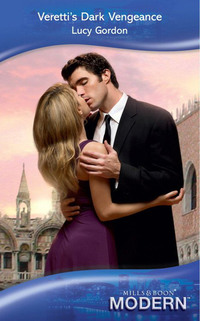
Полная версия
The Italian's Wife By Sunset

The Italian’s Wife by Sunset
Lucy Gordon

www.millsandboon.co.uk
MILLS & BOON
Before you start reading, why not sign up?
Thank you for downloading this Mills & Boon book. If you want to hear about exclusive discounts, special offers and competitions, sign up to our email newsletter today!
SIGN ME UP!
Or simply visit
signup.millsandboon.co.uk
Mills & Boon emails are completely free to receive and you can unsubscribe at any time via the link in any email we send you.
CONTENTS
CHAPTER ONE
CHAPTER TWO
CHAPTER THREE
CHAPTER FOUR
CHAPTER FIVE
CHAPTER SIX
CHAPTER SEVEN
CHAPTER EIGHT
CHAPTER NINE
CHAPTER TEN
CHAPTER ELEVEN
CHAPTER TWELVE
CHAPTER ONE
THE picture on the computer screen seemed to fill the room with humour and good cheer. It showed a young man of strikingly attractive looks, fair, shaggy hair, dark blue glowing eyes and a smile that hinted at mischief.
‘Oh, wow!’ Jackie sighed. ‘Just look at him!’
Della chuckled indulgently. Her secretary was young and easily moved by male beauty. She, herself, tried to be more detached.
‘He’s not bad,’ she conceded.
‘Not bad?’ Jackie echoed, scandalised. ‘He’s a dream.’
‘But I need more than a pretty face. I need a man who really knows his stuff, preferably one who’s already made a name for himself.’
‘Della, this is a TV series you’re producing. It matters how he looks.’
‘Yes, it matters that he looks like a serious expert and not a mere boy. Carlo Rinucci can’t be more than about twenty-five.’
‘According to his data he’s thirty,’ Jackie said, thumbing through papers. ‘And he has a big reputation in ruins and bones and things like that.’
‘But he’s Italian. I can’t have him fronting an English television series.’
‘Some of which will be based in Italy. Besides, it says here that he speaks perfect English, and you’ve said yourself that you have to sell the series internationally if it’s to make any money.’
This was true. In the world of television Della was a big shot, with her own production company and a brilliant reputation. Her programmes were in great demand. Even so, she had to consider the practicalities.
She studied Carlo Rinucci’s face again, and had to admit that he had a lot going for him. He wasn’t merely handsome. His grin had a touch of delightful wickedness, as though he’d discovered a secret hidden from the rest of the world.
‘I had an uncle once,’ Jackie said. ‘He was a travelling salesman with a girl in every town and a line in flattery that would charm the birds off the trees. And no matter what he did everyone forgave him, just for the sake of his smile. Dad used to say Uncle Joe hadn’t just eaten the Apple of Life, he’d gone to live in the tree.’
‘And you think he’s the same?’ Della mused, scrutinising Carlo’s laughing face.
‘I’d take a bet on it.’
Privately Della agreed, but she kept that thought to herself. Her hard-won caution was warning her not to go overboard for this young man just because he looked good. Very good. Marvellous.
His resumé was certainly impressive. George Franklin, her assistant, who was helping to research this series, had e-mailed her.
Don’t be misled by his youth. Carlo Rinucci is the up-and-coming man in his field. He’s done some impressive work and written a couple of books that have attracted attention. His opinions are often unorthodox, but his work is sound.
He’d added a few notes about Carlo Rinucci’s current project at Pompeii, the little town just south of Naples, buried long ago in the lava of the erupting volcano Vesuvius, and he’d finished with the words: Believe me, he’s worth investigating.
‘Worth investigating,’ Della murmured.
‘I’ll investigate him for you,’ Jackie said eagerly. ‘I could get the next plane to Naples, look him over and report back.’
‘Nice try,’ Della said, amused.
‘You mean you’ve already bagged him for yourself?’
‘I mean,’ Della said severely, ‘that I shall consider all the options in a serious and practical way, make my evaluation, and decide what is best for the programme.’
‘That’s what I said. You’ve bagged him for yourself.’
Della laughed and dropped her formal tone.
‘Well, there has to be some advantage in being the boss,’ she said.
‘No kidding! If you use him the ratings will go through the roof. Every country will want to buy the programme. You’ll have a great reputation.’
‘Some people think I already have a reputation,’ Della said in mock offence.
‘Not like the one you’ll have if he’s working for you.’
‘So you think I should hire him to make my name for me? Thanks a lot, but I don’t need help from him or any other pretty boy getting through life on his charm.’
‘You don’t know that he’s char—’
‘Just look at the time! You should be going home.’
Jackie departed, but not without one final lingering look at the computer screen.
‘Behave yourself,’ Della commanded, laughing. ‘He’s not that gorgeous.’
‘Oh, yes, he is,’ Jackie sighed as she retreated and closed the door.
For Della there was no journey to and from work, as she ran her business from her own home—a houseboat moored on the Thames, near Chelsea. She treasured it, not only for its own sake, but also as a symbol of the distance she’d travelled since the day she’d started out with almost nothing.
Now that it was six o’clock her working day hadn’t ended, merely moved into a new phase—making calls to the other side of the world in different time zones. She kicked off her shoes and settled down.
Carlo Rinucci’s face was still on the screen, but she refused to allow him to distract her. She reached out for the mouse, ready to click him into cyberspace, but her hand paused of its own accord.
Right from the start she’d insisted that the presenter for her series about places of great historical events must be someone with an impressive academic name.
‘I don’t want a handsome talking head who’s going to reveal himself as a dumb cluck the minute he doesn’t have a script,’ she’d said. ‘In fact, I’ll expect him to write a lot of the script.’
She’d reviewed a host of possibilities, both male and female, all serious people with impressive reputations. One woman had aroused great hopes, but in the audition she became pompous. One man had seemed a real possibility—in his forties, elegant, serious, yet attractively suave—until he stood in front of a camera and became tongue-tied.
‘I’ll bet you’re never lost for words,’ she said, addressing the screen. ‘Just looking at you, I know that. You can talk the hind legs off a donkey, which probably helped you get some of those fine-sounding qualifications.’
Then she stopped and stared. She could have sworn he’d winked at her.
‘Enough of that,’ she reproved him sternly. ‘I know your kind. My second husband was just like you. Talk about charm! The trouble was, charm was all Gerry had—unless you include a genius for spending other people’s money.’
She poured herself a drink and leaned back, contemplating the face with reluctant pleasure.
‘Am I being unreasonable?’ she asked him. ‘Am I against you just because other people are for you? I know I’m a bit contrary. At least, folk claim that I am. They say I’m difficult, awkward, stubborn—and that’s just my friends talking. But I’ve got a good life. I have a career that gives me all I want, and I’m immune to male attraction—well, sort of immune. Most of the time. You do nothing for me. Nothing at all.’
But he didn’t believe her. She could see that in his face.
She gazed at him. He gazed back. What came next hovered inevitably in the air between them.
‘So I guess,’ she said slowly, ‘there’s no reason why I can’t set up a meeting and look you over.’
‘This place looks as though a bomb had hit it,’ Hope Rinucci observed.
She was surveying her home: first the main room, then the dining room, then the terrace overlooking the Bay of Naples with a distant view of Vesuvius.
‘Two bombs,’ she added, viewing the disarray.
But she did not speak with disapproval, more like satisfaction. The previous evening there had been a party, and in Hope’s opinion a party that didn’t leave the surroundings looking shattered was no party at all.
By that standard last night had been a triumphant success.
Ruggiero, one of her younger sons, came into the room very carefully, and immediately sat down.
‘It was a great night,’ he said faintly.
‘It was indeed,’ she said at once. ‘We had so much to celebrate. Francesco’s new job. Primo and Olympia, with Olympia’s parents over from England, and the news that she’s going to have a baby. And then Luke and Minnie saying that they’re going to have a baby, too.’
‘And then there’s Carlo,’ Ruggiero mused, naming his twin. ‘Mamma, did you ever work out which of those three young ladies was actually his girlfriend?’
‘Not exactly,’ she said, taking him a black coffee, which he received gratefully. ‘They all seemed to arrive together. If only Justin and Evie could have been here as well. But she is so heavily pregnant with the twins that I can understand her not wanting to travel. She promised to bring them to see us as soon as possible after they arrive.’
‘So we can have another party,’ Ruggiero said. ‘Perhaps by then Carlo will have managed to divide himself into three.’
‘Do you know which lady he went home with?’
‘I didn’t see him leave, but I have the impression that they all went together,’ Ruggiero said enviously. ‘Mio dio, but he’s a brave man!’
‘Who’s a brave man?’ Francesco asked, coming carefully into the room.
Hope smiled and poured another coffee.
‘Carlo,’ she said. ‘He brought three young ladies last night. Didn’t you see?’
‘He didn’t notice anything but that exotic redhead,’ Ruggiero said. ‘Where did you find her?’
Francesco thought for a minute before saying, ‘She found me—I think.’
‘We were wondering which of his dates Carlo took home to his apartment,’ Ruggiero said.
‘He didn’t go back there,’ Francesco observed.
‘How can you possibly know that?’ Hope asked.
‘Because he’s here.’
Francesco pointed to a large sofa facing the window. Leaning over the back, the others saw a young man stretched out, blissfully asleep. He was in the clothes he’d worn the previous night, his shirt open at the throat, revealing smooth, tanned skin. Everything about him radiated sensual contentment.
‘Hey!’ Ruggiero prodded him rudely.
‘Mmm?’
His twin prodded him again, and Carlo’s eyes opened.
It was a source of intense irritation to his brothers that Carlo didn’t awake bleary-eyed and vague, like normal people. Even after sleeping off a night of indulgence he was instantly alert, bright-eyed and at his best. As Ruggiero had once remarked, it was enough to make anyone want to commit murder.
‘Hallo,’ he said, sitting up and yawning.
‘What are you doing there?’ Ruggiero demanded, incensed.
‘What’s wrong with my being here? Ah, coffee! Lovely! Thanks, Mamma.’
‘Take no notice of this pair,’ Hope advised him. ‘They’re jealous.’
‘Three,’ Ruggiero mourned. ‘He had three, and he slept on the sofa.’
‘The trouble is that three is too many,’ Carlo said philosophically. ‘One is ideal, two is manageable if you’re feeling adventurous, but anything more is a just a problem. Besides, I wasn’t at my best by the end of the evening, so I played safe, called a taxi for the ladies and went to sleep.’
‘I hope you paid their fares in advance,’ Hope said.
‘Of course I did,’ Carlo said, faintly shocked. ‘You brought me up properly.’
Francesco was aghast.
‘Of all the spineless, feeble—’
‘I know, I know.’ Carlo sighed. ‘I feel very ashamed.’
‘And you call yourself a Rinucci?’ Ruggiero said.
‘That’s enough,’ Hope reproved them. ‘Carlo behaved like a gentleman.’
‘He behaved like a wimp,’ Francesco growled.
‘True,’ Carlo agreed. ‘But there can be great benefits to being a wimp. It makes the ladies think you’re a perfect gentleman, and then, when next time comes—’
He drained his coffee, kissed his mother on the cheek, and escaped before his brothers vented their indignation on him.
The Hotel Vallini was the best Naples had to offer. It stood halfway up a hill, looking down on the city, with a superb view across the bay.
Standing on her balcony, Della kept quite still, regarding Vesuvius, where it loomed through the heat haze. There was nowhere in Naples to escape the sight of the great volcano, with its combination of threat and mystery. Its huge eruption nearly two thousand years ago, burying Pompeii in one day, had become such a legend that it was the first site Della had chosen when she was planning her series.
The three-hour flight had left her feeling tired and sticky. It had been a relief to step under a cool shower, wash away the dust, then dress in fresh clothes. The look she’d chosen was neat and unshowy, almost to the point of austerity: black linen pants, and a white blouse whose plainness didn’t disguise its expensive cut.
Businesslike, she told herself. Which was true, but only partly. The outfit might have been designed to show off her tall, slim figure, with its small, elegant breasts and neat behind. Just how much satisfaction this gave her was her own secret.
Her face told a subtly different story, the full mouth having a touch of voluptuousness that was at variance with her chic outline. Her rich, light brown hair was sometimes pulled back in severe lines, but today she’d let it fall about her face in gentle curves, emphasising the sensuality of her face.
The contrast between this and the plain way she dressed caused a lot of enjoyable confusion among her male acquaintances. And she didn’t mind that at all.
She had told nobody that she was coming, preferring to take her quarry unawares. She didn’t even know that Carlo Rinucci would be at Pompeii today, only that he was working on a project that concerned the place, investigating new theories.
She hurried downstairs. It was early afternoon, and just time enough to get out there and form the impressions that would help her when she went into action next day.
Taking a taxi to the railway station, she bought a ticket for the Circumvesuviana, the light railway that ran between Naples and Pompeii, taking about half an hour. For most of that time she sat gazing out of the window at Vesuvius, dominating the landscape, growing ever nearer.
From the station it was a short walk to the Porta Marina, the city gate to Pompeii, where she purchased a ticket and entered the ruined city.
The first thing that struck her was the comparative quiet. Tourists thronged the dead streets, yet their noise did not rise above a gentle murmur, and when she turned aside into an empty yard she found herself almost in silence.
After the bustle of her normal life the peace was delightful. Slowly she turned around, looking at the ancient stones, letting the quiet seep into her.
‘Come here! Do you hear me? Come here at once.’
The shriek rent the atmosphere, and the next moment she saw why. A boy of about twelve was running through the ruins, hopping nimbly over stones, hotly pursued by a middle-aged woman who was trying to run and shout at the same time.
‘Come here!’ she called in English.
The youngster made the mistake of looking back, which distracted him enough for Della to step into his path and grab him.
‘Lemme go!’ he gasped, struggling.
‘Sorry, no can do,’ she said, friendly but implacable.
‘Thank you,’ puffed the teacher, catching up. ‘Mickey, you stop that. Come back to the rest of the class.’
‘But it’s boring,’ the boy wailed. ‘I hate history.’
‘We’re on a school trip,’ the woman explained. ‘The chance of a lifetime. I’d have been thrilled to go to Italy when I was at school, but they’re all the same, these kids. Ungrateful little so-and-sos!’
‘It’s boring,’ repeated the boy sullenly.
The two women looked at each other sympathetically. Quick as a flash the lad took his chance to dart away again, and managed to get out of sight around a corner. By the time they followed he’d found another corner and vanished again.
‘Oh heavens! My class!’ wailed the teacher.
‘You go back to them while I find him,’ Della said.
It was easier said than done. The boy appeared to have vanished into the stones. Della ran from street to street without seeing him.
At last she saw two men standing by a large hole in the ground, evidently considering the contents seriously. The younger man looked as though he’d just been working in the earth. Through his sleeveless vest she could see the glisten of sweat on strong, young muscles, and he was breathing hard.
In desperation she hailed them.
‘Did a boy in a red shirt run past? He’s a pupil escaping from a school party and his teacher is frantic.’
‘I didn’t see anyone,’ the older man remarked. ‘What about you, Carlo?’
Before she could react to the name the young man with his back to her turned, smiling. It was the face she’d come to see, handsome, merry, relaxed.
‘I haven’t noticed—’ he began to say, but broke off to cry, ‘There!’
The boy had appeared through an arch and started running across the street. Carlo Rinucci darted after him, dodging back and forth through archways. The boy’s scowl vanished, replaced by a smile. Carlo grinned back, and it soon became a game.
Then the other children appeared, a dozen of them, hurling themselves into the game with delight.
‘Oh, dear!’ sighed the teacher.
‘Leave them to it,’ Della advised. ‘I’m Della Hadley, by the way.’
‘Hilda Preston. I’m supposed to be in charge of that lot. What am I going to do now?’
‘I don’t think you need to do anything,’ Della said, amused. ‘He’s doing it all.’
It was true. The youngsters had crowded around the young man, and by some mysterious magic he had calmed them down, and was now leading them back to the teacher.
Like the Pied Piper, Della thought, considering him with her head on one side.
‘OK, that’s enough,’ he said, approaching. ‘Cool it, kids.’
‘Whatever do you think you’re doing?’ Hilda demanded of the youngsters. ‘You know I told you to stay close to me.’
‘But it’s boring,’ complained the boy who’d made a run for it. ‘I don’t care if it is,’ she snapped, goaded into honesty. ‘I’ve brought you here to get some culture, and that’s what you’re going to get.’
Della heard a soft choke nearby, and turned to see Carlo fighting back laughter. Since she was doing the same herself, a moment of perfect understanding flashed between them. They both put their hands over their mouths at the same moment.
Predictably, the word culture had caused the pupils to emit groans of dismay. Some howled to heaven, others clutched their stomachs. One joker even rolled on the ground.
‘Now she’s done it,’ Carlo muttered to Della. ‘The forbidden word—one that should never be spoken, save in a terrified whisper. And she said it out loud.’
‘What word is that?’
He looked wildly around, to be sure nobody was listening, before saying in a ghostly voice, ‘Culture.’
‘Oh, yes, I see.’ She nodded knowingly.
‘You’d think a modern schoolteacher would know better. Does she do that often?’
‘I don’t know—I’m not—’ she began, realising that he thought she was one of the school party.
‘Never mind,’ he said. ‘It’s time for a rescue operation.’ Raising his voice, he said, ‘You can all calm down, because this place has nothing to do with culture. This place is about people dying.’ For good measure he added, ‘Horribly!’
Hilda was aghast. ‘He mustn’t say things like that. They’re just children.’
‘Children love gore and horror,’ Della pointed out.
‘It’s about nightmares,’ Carlo went on, ‘and the greatest catastrophe the world has ever known. Thousands of people, living their ordinary lives, when there was an ominous rumble in the distance and Vesuvius erupted, engulfing the town. People died in the middle of fights, of meals—thousands of them, frozen in one place for nearly two thousand years.’
He had them now. Everyone was listening.
‘Is it true they’ve got the dead bodies in the museum?’ someone asked, with relish.
‘Not the actual bodies,’ Carlo said, in the tone of a man making a reluctant admission, and there was a groan of disappointment.
Bloodthirsty little tykes, Della thought, amused. But he’s right about them.
‘They were trapped and died in the lava,’ Carlo continued, ‘and when they were excavated, centuries later, the bodies had perished, leaving holes in the lava of the exact shapes. So the bodies could be reconstructed in plaster.’
‘And can we see them?’
‘Yes, you can see them.’
A sigh of blissful content showed that his audience was with him. He began to expand on the subject, making it vibrantly alive. He spoke fluently, in barely accented English, with an actor’s sense of the dramatic. Suddenly the streets were populated with heroes and villains, beautiful heroines, going about their daily business, then running hopelessly for their lives.
Della seized the chance to study him in action. It went against the grain to give him top marks, but she had to admit that he ticked every box. The looks she’d admired on the screen were enhanced by the fact that his hair needed a trim, and hung in shaggy curls about his face.
He looked like Jack the Lad—a brawny roustabout without a thought in his head beyond the next beer, the next girl, or the next night spent living it up. What he didn’t look like was an academic with a swathe of degrees, one of them in philosophy.
‘History isn’t about culture,’ he finally reassured them. ‘It’s about people living and dying, loving and hating—just like us. Now, go with your teachers and behave yourself, or I’ll drown you in lava.’
A cheer showed that this threat was much appreciated.
‘Thank you,’ Hilda said. ‘You really do have a gift with children.’
He grinned, his teeth gleaming against the light tan of his face.
‘I’m just a born show-off,’ he laughed.
That was true, Della mused. In fact, he was exactly what she needed.
Hilda thanked her and turned to shepherd the children away. Carlo looked at her in surprise.
‘Aren’t you with them?’ he asked.
‘No, I just happened along,’ she said.
‘And found yourself in the middle of it, huh?’
They both laughed.
‘That poor woman,’ Della said. ‘Whoever sent her here on a culture trip should have known better.’
He put out his hand.
‘My name is Carlo Rinucci.’
‘Yes, I—’ She was about to say that she knew who he was, but hastily changed it to, ‘I’m Della Hadley.’
‘It is a great pleasure to meet you, signorina—or should that be signora?’
‘Technically, yes. I’m divorced.’
He gave her a gentle, disarming smile, still holding her hand.
‘I’m so glad,’ he said.
Watch it, warned a voice in her head. He plays this game too well.
‘Hey, Carlo,’ called the other man, ‘are you going to give the signora her hand back, or shall we put it in the museum with the others?’












